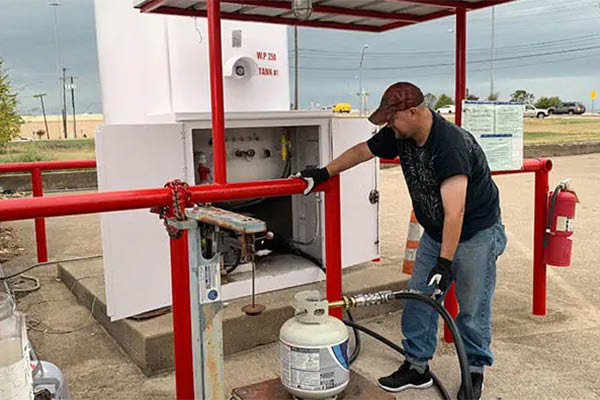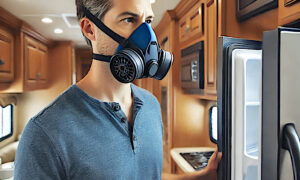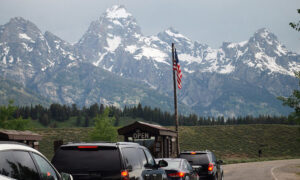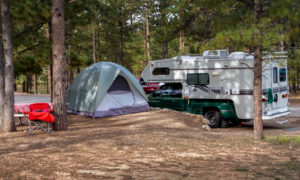
Last updated on November 8th, 2023 at 03:21 pm
It is essential for RVers to understand the importance of proper propane cylinder Safety. Handling and misuse can lead to property damage, injuries, and even death. This article provides valuable tips for safe propane cylinder handling to enjoy your time on the road without worry.
Propane Cylinder Safety Check for Leaks
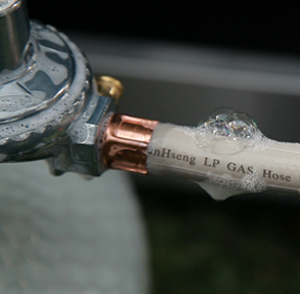
Use a soapy water solution to spray around propane cylinder valves and connections. A leak must be addressed if bubbles form before using the propane cylinder. All hoses and fittings must be secure, tight, and free from cracks, gouges, corrosion, or other damage. Never use force or tools to attach or remove fittings or hoses from propane cylinders, as this can cause a leak or gas buildup in the line.
Store Propane Cylinders Properly
It is important that propane cylinders be stored outdoors, in an upright position in a well-ventilated area, out of direct sunlight, away from sources of heat or flame, and away from combustible materials such as wood or dry grass. Secure the cylinders with proper restraints to prevent them from rolling or falling over. Never store cylinders in an enclosed area such as a shed, garage, or vehicle, as this could lead to a buildup of explosive vapors.
Use a Propane Regulator
RVs and most propane appliances have a propane regulator, but you must be sure before you connect the propane cylinder. A regulator reduces high pressure from the propane cylinder to the pressure required by the appliance.
Open Flame Around Propane Cylinders
Propane cylinders should never be left where they may come into contact with open flames. Follow the manufacturer’s instructions when used with BBQs, propane firepits and campfires.
Additionally, don’t smoke or allow anyone else to smoke near propane cylinders.
Always ensure that any activities involving propane cylinders should be done in a well-ventilated area. Furthermore, turning off all appliances and valves connected to the propane cylinder is always recommended before attempting to move or handle the cylinder.
Transporting Propane Cylinders Safety
Propane cylinder safety requires transporting your propane cylinder directly to and from the refill station. Transport propane cylinders upright. The best way to transport propane cylinders is to place them in an open truck bed, secured with ropes or straps. It is not advised to transport inside a car. Make sure there is proper ventilation and avoid any sources of heat.
Do not drop or drag the tanks when loading and unloading, as this can damage them. When transporting multiple tanks, it is best to space them apart and strapped down securely so they do not come into contact with each other or anything else that could cause a spark or ignition source. After a trip, inspect the tanks and valves for any damage that may have occurred during transport.
Never transport or leave propane cylinders in a car. Transporting propane cylinders in your car can cause heat built from sunlight, and motion can increase pressure to an unsafe level causing venting of the safety valve, which creates a flammable, explosive environment.
Periodically Inspect Your Propane Cylinders
Inspect your propane cylinders for current certification, damage such as, has a bent or missing collar or foot ring, or excessive rust. It’s a good idea to inspect them before refilling, as any of the above problems violate propane gas rules and policies and can not be filled by vendors.
Propane Cylinder Safety Recertification
If you have an older Travel Trailer or Fifth Wheel, you should know that according to Federal law, DoT cylinders may only be used for 12 years after their manufacture date. After that, the cylinders must be “recertified,” which provides another five years of use. The cylinders can be re-certified every five years after that.
It is important to check the date stamped on your cylinders, as they may be older than your RV. Propane vendors must verify the date stamped on the cylinder is valid before filling it. Large bulk propane suppliers usually do re-certification, but some RV repair shops may also certify cylinders. They might do the job for free if you are a good customer, so check with them first.
Be sure to mark any old or new cylinders to track when they were manufactured and certified. A sharpie marker works well for this task.
LPG Tank Recall – Fleetwood & Holiday Rambler



